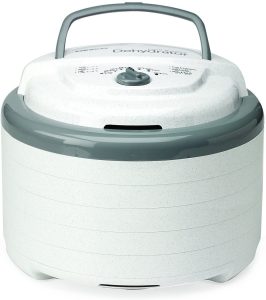Freshly cracked eggs sizzling over a fire is my breakfast of choice while camping. It’s nutritious, delicious and very easy to make.
However, there was a time when I thought having eggs while camping was impossible. How long would eggs last? How do I prevent them from breaking? And are de-hydrated eggs any good?
So, if you’re thinking about bringing eggs camping, here’s everything you need to know!

1. How Long Do Eggs Last Unrefrigerated?
Perhaps the most common question I hear when it comes to camping food is how long do eggs last unrefrigerated.
Well, the non-refrigeration time totally depends on the type of egg. There is a HUGE difference between store-bought refrigerated eggs and freshly laid eggs.
Eggs purchased at your local grocery store have been washed which removes the natural protective mucus (cuticle) layer found on freshly laid eggs. This natural mucus layer helps prevent bacteria from passing through the porous egg shell. Refrigeration slows down bacteria growth once the mucus layer has been removed.
According to Health Canada, store-bought refrigerated eggs (raw or cooked) should not be kept at room temperature for more than 2 hours.
Since a lot of campers travel with a cooler or ice chest, this allows them to keep these types of eggs cool. Well, as long as the ice stays frozen… Personally, I’ve gone weekend camping in the fall without a cooler and the eggs have lasted for two days without a problem.
On the other hand, freshly laid eggs can last up to a month before they need to be refrigerated. So, if you are planning on going into the back-country or for an extended camping trip with no cooler or access to ice, you’re in luck!
Although it takes a bit more effort to find freshly laid eggs, it’s worth the search. You’ll need to find a grocer or purchase them directly from a farm.
Just give them a good wash and cook them thoroughly before eating. And, enjoy!
2. How to Keep Eggs Safe While Camping?
Eggs are probably the most fragile perishable good in your food container. Loosely packed, unprotected eggs can be damaged during transport. Also, exposure to moisture can increase the chance of bacterial growth.
So, it’s best to keep eggs dry and cool, individually stored and protected from impact.
Although cardboard egg cartons are fantastic (absorbing impacts and fire starter material), if left in a cooler they can get wet will eventually disintegrate. Styrofoam or wax covered egg cartoons will last much longer but must be disposed of properly.
Personally, I prefer to pack eggs in a plastic cartoon. I use a rubber band to keep the lid secure and position the package near the top of my food container. I also handle my food container very carefully to prevent jostling.
You can keep eggs safe and secure in a dedicated plastic egg holder. They’re inexpensive, durable, and light-weight making them perfect for camping.
3. Are Dehydrated Eggs Good for Camping?
If you are limited on space or weight, or worried about eggs breaking, dehydrated eggs might be your savior. Dehydrated eggs are moisture free, decreasing your overall pack weight and inhibiting the growth of bacteria.
Pre-Packaged Dehydrated or Powdered Eggs
Dehydrated, freeze-dried or powdered eggs are fully cooked but with all the water removed. They are also packaged so that no moisture can enter.
So, when you’re ready to have eggs, simply add boiling water to dehydrated eggs. The hot water re-hydrates the eggs, making them fluffy, typically in 10 minutes!
Although not exactly the same texture and consistency of fresh eggs, re-hydrated eggs contain the same caloric and nutritional properties. Taste-wise, they are very similar to fresh eggs.
Store-bought packaged dehydrated eggs are somewhat expensive but offer a lot of convenience. They are sometimes pre-seasoned or mixed with bacon bits. Delicious!
DIY Dehydrated Eggs at Home
You can also dehydrate eggs (with all the fixings) at home and pack them yourself. Just cook eggs the way you like it (my preference is scrabbled with veggies) and place them in a dehydrator for 8 to 10 hours.
Make sure you cook the eggs without adding butter since fats do not de-hydrate and will cause food to spoil.
Although this takes more time and effort, you can end up saving a lot of money in the long term. Also, you can dehydrate other meals saving you even more money.
Pro-tip: A secret ingredient I like to add to my dehydrated egg mixture is powdered milk. This makes the eggs taste creamier when it’s cooked! Try it out yourself and see if it makes a difference.
If you’re thinking about purchasing a dehydrator, make sure it has the ability to select multiple heat settings and comes with multiple mesh and solids sheets for each tray. This way you can not only dehydrate eggs, but also fruit, meat, pasta and other food for camping.

Food Dehydrated (Top Selling on Amazon!)
- Adjustable temperature settings
- 5 trays included, but expandable to 12 trays!
- 2 fruit roll sheets and 2 screen sheets included
4. Are Liquid Eggs Good for Camping?
Another great alternative for camping is liquid eggs. No cracking or re-hydration required!
Liquid eggs can be simply poured into a skillet or pan and cooked like regular eggs. You can purchase liquid whole eggs (with yolk) or egg whites (no yolks) at most grocery stores.
Liquid eggs need to be kept refrigerated and, once opened, need to be consumed within 6 days. As far as taste and consistency are concerned, they are exactly like regular eggs.
So, if you’re planning a car camping trip, maybe consider bringing a carton of liquid eggs instead!



This article contains affiliate links, which help support this blog at no cost to you!

Omg…this is a topic that is close to my heart….this is great to promote farm fresh laid eggs.
I rate this article “egg’celent